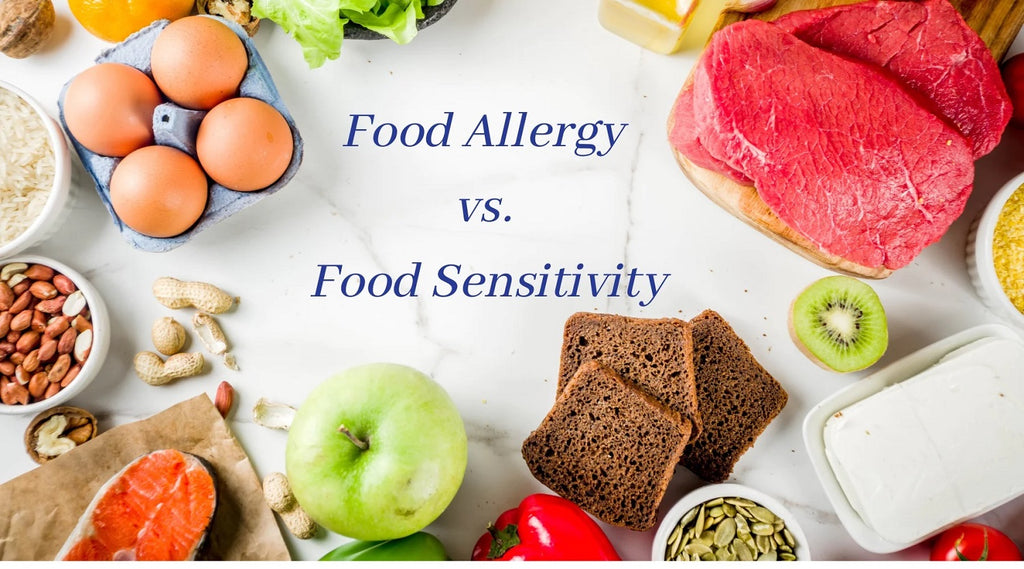
Food Sensitivities and Allergies: What You Need to Know for the Holidays
The festive season is a time for family gatherings, delicious food, and lots of cheer. However, for those with food sensitivities and allergies, it can also bring stress and anxiety, especially when navigating holiday feasts filled with rich, sometimes unfamiliar dishes. If you or someone in your household has a food allergy or sensitivity, understanding what to look out for and how to manage potential risks can help ensure everyone enjoys the celebrations safely.
In this blog, we’ll break down the key information about food sensitivities and allergies, how to manage them during the holidays, and some tips for safe and delicious holiday meals that everyone can enjoy.
What’s the Difference Between Food Sensitivity and Allergy?
Before diving into the specifics of managing food sensitivities and allergies during the holidays, it's essential to understand the difference between the two.
- Food Allergy: A food allergy occurs when the immune system mistakenly identifies a normally harmless food as a threat and reacts to it. Common symptoms can include swelling, hives, difficulty breathing, or even anaphylaxis (a severe, life-threatening reaction). Common food allergens include peanuts, tree nuts, shellfish, milk, eggs, fish, soy, and wheat.
- Food Sensitivity (or Intolerance): A food sensitivity, on the other hand, is typically less severe. It occurs when your body has difficulty digesting or processing certain foods. Common symptoms include bloating, stomach cramps, diarrhoea, or skin irritations. Unlike food allergies, food sensitivities do not involve the immune system. Dairy, gluten, and certain additives or preservatives are common culprits.
For both types of food issues, holiday meals can become a source of concern if they are not handled properly. Whether you're hosting or attending a holiday meal, it's important to take proactive steps to keep everyone safe.
Managing Food Sensitivities and Allergies at Holiday Gatherings
- Communication is Key
The first step in managing food sensitivities and allergies during the holidays is to communicate openly with your hosts or guests. If you are hosting the meal, take the time to check with all your guests beforehand to understand any dietary restrictions. If you are attending a gathering, make sure to inform the host of any allergies or sensitivities well in advance. It may feel awkward, but the safety of your loved ones should always come first.
Here are some tips for open communication:
- Be specific about allergens: For example, instead of saying "I can't have dairy," specify whether it's all dairy or just certain types (like milk vs cheese).
- Offer to bring your own dish: If the host is unsure about how to accommodate your needs, offer to bring a dish or two that you can safely enjoy.
- Provide resources: Consider providing links to allergen-free recipes or suggesting safe substitutes. This can make the process easier for the host and show that you're being considerate of their time.
- Know the Ingredients and Read Labels
Holiday meals are often filled with rich, homemade foods where ingredients may not be clearly labelled. This can be a problem for those with food allergies or sensitivities.
When preparing food, make sure to:
- Ask for ingredient lists: If the dish is store-bought, ask for the label or ingredient list to ensure it’s safe.
- Be cautious with cross-contamination: Ensure that shared cooking tools and surfaces are thoroughly cleaned between preparing different dishes, especially when handling allergenic ingredients.
- Understand hidden ingredients: Some ingredients, such as gluten, dairy, and eggs, can be found in unexpected products like sauces, dressings, and even processed meats or stuffing. Always ask about these ingredients.

- Safe Substitutes for Common Holiday Foods
The holidays are often synonymous with traditional meals like turkey, stuffing, mashed potatoes, and festive desserts. Fortunately, there are plenty of alternatives that can help make your meal just as enjoyable without triggering any food sensitivities or allergies.
- Dairy-free: Many people are sensitive to dairy or lactose intolerant, but there are plenty of alternatives. Use coconut milk, almond milk, or oat milk in mashed potatoes, creamy sauces, or desserts. Vegan butter or olive oil can replace butter in most recipes.
- Gluten-free: Traditional stuffing can be made gluten-free by using gluten-free bread or rice instead of regular bread. Many stores now offer gluten-free versions of pies, cakes, and other baked goods, or you can make your own using almond flour or rice flour.
- Nut-free: If you're dealing with nut allergies, be cautious of dishes that contain nuts or nut oils, such as some stuffing recipes or desserts. Substitute nuts with seeds like pumpkin or sunflower, which provide a similar texture and flavour without the allergenic risks.
- Egg-free: For egg sensitivities or vegan guests, try using flaxseed or chia seed eggs (1 tablespoon of ground seeds mixed with 3 tablespoons of water) as a substitute in baking. For recipes like mashed potatoes or gravy, try thickening with arrowroot powder or cornstarch.
- Be Mindful of Alcohol and Cocktails
Alcohol can sometimes be a hidden culprit in food sensitivities. Some alcoholic beverages contain ingredients that might trigger a reaction, such as gluten in beer or traces of nuts in certain liqueurs. Additionally, some people with food sensitivities may have trouble with the high sugar content or preservatives in certain cocktails.
- Choose allergen-friendly drinks: Wine and pure spirits like gin, vodka, and rum are often safer choices for those with food sensitivities. Be cautious with pre-made mixers, which can contain hidden allergens.
- Non-alcoholic options: Offer a variety of non-alcoholic drinks for guests who may be avoiding alcohol or have sensitivities to certain ingredients. Sparkling water with fruit or homemade punches can be festive and fun.
- Emergency Preparedness
Even with careful planning, it's still a good idea to be prepared in case of an allergic reaction. Always carry necessary medications such as antihistamines or an epinephrine auto-injector (EpiPen) if prescribed, and make sure everyone around you knows how to use them in an emergency.
- Know the symptoms: Familiarise yourself with the signs of an allergic reaction, such as swelling, difficulty breathing, or a rash. Reacting quickly can prevent serious complications.
- Have a plan: If you're hosting, make sure you know where the nearest hospital or urgent care centre is and that you have emergency contact numbers at hand.
Conclusion
Food sensitivities and allergies don’t have to put a damper on your holiday celebrations. With a little planning, clear communication, and a few thoughtful substitutions, everyone can enjoy the festive feast safely. Remember to communicate with your guests or hosts ahead of time, read labels, be aware of hidden allergens, and keep emergency plans in place. By being mindful of these steps, you can focus on what really matters – making memories, sharing joy, and celebrating the season with loved ones.

